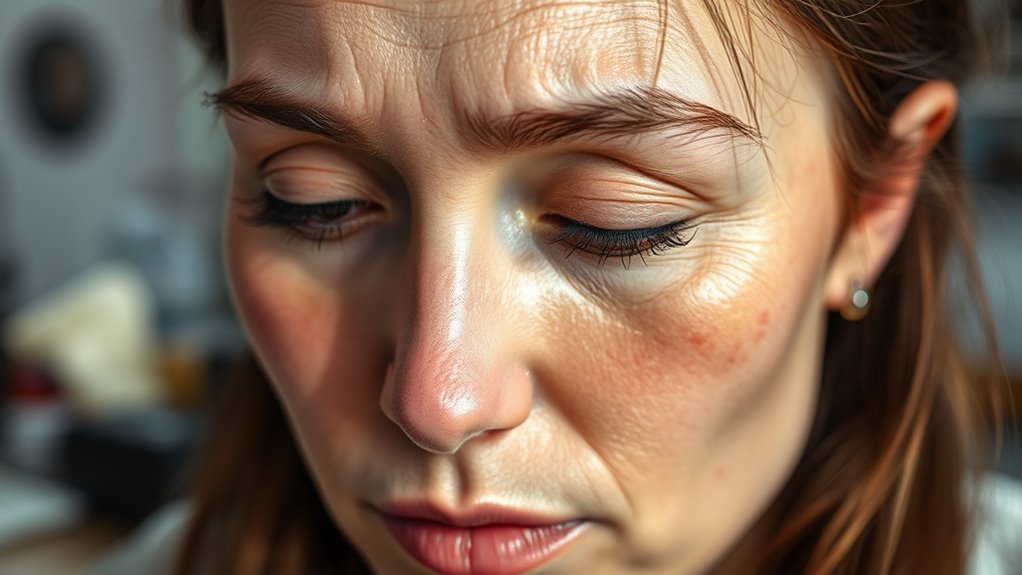Is Stress Destroying Your Skin Barrier. Find Out Now
Stress is wreaking havoc on your skin barrier, and the consequences can be severe. Elevated cortisol levels lead to increased permeability, causing moisture loss and inflammation. This opens the door to various skin issues like acne and eczema. How can you combat this overwhelming force? Understanding the connection between stress and skin health is crucial to restoring your skin’s resilience and overall appearance. Let’s explore the factors at play and effective strategies for improvement.
Key Takeaways
- Stress hormones like cortisol increase skin barrier permeability, making it vulnerable to damage.
- Elevated cortisol levels lead to increased oil production, causing acne breakouts.
- Stress can exacerbate existing skin conditions such as eczema and psoriasis.
- Disruption of the skin barrier results in dryness and increased sensitivity.
- Consistent stress management techniques can help maintain a healthy skin barrier.
Understanding the Skin Barrier Function
The skin barrier plays a crucial role in protecting your body from environmental aggressors and maintaining hydration.
Composed primarily of lipids and proteins, it acts as a shield, preventing moisture loss and blocking harmful substances.
The skin barrier, made of lipids and proteins, protects against moisture loss and harmful external agents.
When you experience stress, your body releases hormones that can compromise this barrier, leading to increased permeability.
This disruption can allow irritants to penetrate, causing inflammation and irritation.
It’s essential to understand that a healthy skin barrier is vital for overall skin health. Properly caring for the skin barrier can significantly improve its resilience against stress-related damage.
The Impact of Stress on Skin Health
Stress significantly impacts skin health, exacerbating existing conditions and triggering new issues.
When you’re stressed, your body releases cortisol, which can lead to increased oil production and inflammation.
This hormonal shift disrupts your skin’s natural barrier, making it more susceptible to irritation and breakouts.
Additionally, stress often results in poor lifestyle choices, like inadequate sleep and unhealthy eating, further compromising your skin’s integrity.
You might also notice changes in skin hydration and elasticity, as stress can impair cellular function.
Understanding these effects is crucial for maintaining healthy skin and implementing effective stress management strategies in your daily routine. Furthermore, recognizing how stress contributes to skin issues can empower you to take proactive steps toward better skin health.
Common Skin Issues Caused by Stress
Often, individuals experience a range of skin issues when stress levels rise.
Elevated cortisol levels can lead to increased oil production, resulting in acne breakouts.
You might notice your skin becoming more sensitive or reactive, manifesting as redness or inflammation.
Stress can also exacerbate existing conditions like eczema or psoriasis, causing flare-ups.
Additionally, the skin barrier may weaken, leading to dryness and irritation.
Some people may even develop hives or rashes due to stress-induced inflammation.
Recognizing these stress-related skin problems is crucial for taking appropriate steps to protect your skin’s health and maintain its barrier function. Furthermore, understanding the impact of emotional stress on skin health can empower you to manage these reactions more effectively.
Techniques for Stress Management
Managing stress effectively can significantly improve your skin’s health and overall well-being. Here are three techniques to help you manage stress:
| Technique | Benefits | How to Implement |
|———————|——————————-|————————————–|
| Mindfulness Meditation| Reduces anxiety and enhances focus | Set aside 10 minutes daily for practice |
| Physical Exercise | Boosts mood and improves circulation | Engage in 30 minutes of activity 3 times a week |
| Deep Breathing | Lowers cortisol levels | Practice deep breathing for 5 minutes whenever stressed |
Incorporating these techniques into your routine can enhance your mental clarity and support skin barrier health. Additionally, reducing stress can help maintain healthy skin by preventing issues triggered by high cortisol levels.
Building a Resilient Skin Barrier
How can you ensure your skin barrier remains strong and resilient? Start by incorporating a few key practices into your routine:
-
Hydrate regularly: Drink plenty of water and use moisturizers containing ceramides to maintain hydration.
-
Use gentle cleansers: Avoid harsh soaps that strip natural oils; opt for pH-balanced formulations.
-
Protect from environmental stressors: Apply broad-spectrum sunscreen daily to guard against UV damage.
These strategies will help fortify your skin barrier, combating the effects of stress and environmental challenges. It’s also important to recognize the signs that your skin barrier needs help, such as dryness and irritation, as they can guide you in adjusting your skincare routine.
Consistency is crucial; prioritize these habits for optimal skin health and resilience.




